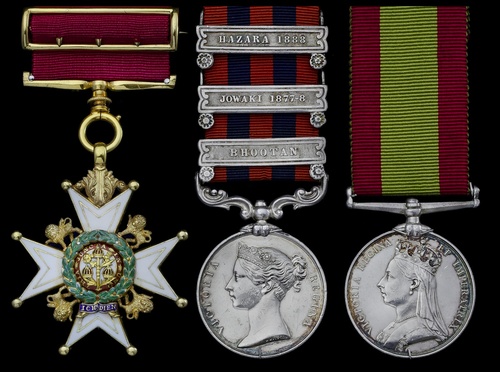
Auction: 19002 - Orders, Decorations and Medals
Lot: 368
(x) The fine C.B. and India service group of three awarded to Colonel A. McCrae Bruce, 4th Punjab Infantry, late 1st Gurkhas, who was twice mentioned in despatches for services on the North-West Frontier
McCrae Bruce's son was gazetted for a posthumous Victoria Cross in 1919, but the Colonel was too ill to attend an investiture at Buckingham Palace and instead it was presented to the recipient's mother at a special ceremony held in Jersey
The Most Honourable Order of The Bath, C.B. (Military) Companion's breast Badge, silver-gilt and enamel, fitted with a narrow swivel-ring suspension and riband buckle; India General Service 1854-95, 3 clasps, Bhootan, Jowaki 1877-8, Hazara 1888 (Lieut. A. McC. Bruce, 1st Goorkha Regt.), last two clasps loose as issued; Afghanistan 1878-80, no clasp (Capt. A. McC. Bruce, 4th Pun. Infy.), the first with minor loss of green enamel, light contact marks to the last two, otherwise good very fine, housed in an old velvet-lined glazed wooden display case by Spink & Son, with engraved silver plaque, 'Col. A. McCrae Bruce, C.B., 4th Punjab Infantry P.F.F., Born 5th Jan. 1842 Died 6th April 1920' (3)
C.B. London Gazette 23 May 1900.
Andrew McCrae Bruce was born in January 1842, the son of William Bruce of Symbister, Shetland. Commissioned into the 2nd Bengal Fusiliers in November 1860, he transferred to the 1st Gurkhas in 1861 and was present in the 1864-66 Bhootan campaign, purportedly fought to avenge Bhootan's maltreatment of the British emissary the Hon. Ashley Eden (Medal & clasp). Following the Bhootanese surrender he transferred to the 4th Punjab Native Infantry, with whom he was to serve until the early 1890s. Appointed Quartermaster on 27 September 1867, in 1869 he took part in operations against Afridi tribesmen on the North-West Frontier, receiving the special thanks of the Government of India for his part in the capture of Garoh village.
The area between Peshawar and the Kohat Pass was ruled by the fierce Jowaki Afridis, whose brazen incursions into British territory posed a severe threat. On 9 November 1877, two British forces under Brigadier-Generals C. P. Keyes and C. C. G. Ross were sent to suppress the Jowaki in a pincer movement, Keyes advancing through Kohat and Ross via Peshawar. The 4th Punjab Native Infantry were assigned to Keyes' column. Both forces laid siege to Jummoo, the Jowaki capital, which fell on 1 December 1877 (clasp).
McCrae Bruce served as a Captain during the 1879-80 Second Afghan War, taking part in Brigadier-General Tytler's expeditions to Chakmani and Zaimusht. These operations were intended to punish local tribesmen 'for their numerous depredations'. Shadbolt's The Afghan Campaign best summarises the part played by the 4th Punjabis during the action at Zawa on 14 December 1879:
'The 4th Punjabis formed the leading portion of the advanced guard of Tytler's column, under the command of Lieutenant-Colonel H. P. Close, which forced the Pass, and destroyed the villages. The enemy at one time occupied a very formidable position, and their fire being accurate and well sustained, the regiment suffered some loss, Lieutenant and Adjutant T. J. O'D. Renny falling mortally wounded early in the engagement. Seeing that a front attack would be attended by great loss, Colonel Close despatched part of the regiment under Major Hawes to turn the enemy's flank. The movement was highly successful: the regiment fired a volley and charged with great impetuosity, causing the enemy to vacate the position with considerable loss, and enabling the rest of the force to advance without further molestation.'
Promoted to Major on 4 November 1880, McCrae-Bruce was mentioned in Brigadier-General T. G. Kennedy's despatch for his services during the 1881 Mahsood-Waziri expedition. He saw active service in the Zhob Valley during 1884, and in 1888 he joined the Hazara operations as a Lieutenant-Colonel (clasp). He was again mentioned in despatches in 1891, for commanding a column during the advance through Miranzai Valley.
Advanced to full Colonel in November 1890, in 1893 he became Acting British Agent at Gilgit in the Karakoram mountains, the epicentre of British moves in the 'Great Game' against Russia for control of central Asia. He was Colonel on the Staff at Ferozepore in 1896-97. His final appointment was as Local Brigadier-General Commanding at Bangalore. Having been awarded a good service pension, he was placed on the Unemployed List on 5 January 1899. In 1900 he was made a Companion of the Bath.
McCrae-Bruce's only son, Lieutenant William Arthur McCrae Bruce, 59th Scinde Rifles, was posthumously awarded the Victoria Cross for gallantry in leading a trench bombing party at Givenchy in December 1914 - 'In spite of being wounded in the neck he walked up and down the trench encouraging his men to hold out against several counter-attacks until he was killed' (London Gazette 4 September 1919, refers). His father was by then too ill to attend a Buckingham Palace investiture, and instead arrangements were made for the Cross to be presented to his mother by the Lieutenant-Governor of Jersey, the old Colonel having settled at 'La Fontaine', Pontac, Jersey on his return from India. He died there on 6 April 1920; his son's V.C. was sold by Christie's in November 1992, when, happily, it was purchased by his old school, Victoria College, Jersey, where it is displayed on special occasions; sold with copied London Gazette entries.
Subject to 5% tax on Hammer Price in addition to 20% VAT on Buyer’s Premium.
Sold for
£1,800
Starting price
£1100




